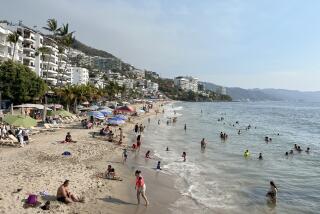Bush warns Sudan of more sanctions
President Bush said Wednesday that the United States would expand and tighten economic sanctions on Sudan if efforts by the United Nations to bring peace to Darfur did not bear fruit soon.
In his most extensive remarks on the crisis, Bush repeated his administration’s assertion that the violence in Darfur constituted a “genocide.” He also raised the possibility of seeking international steps to block the Sudanese government from flying military aircraft in the region.
“It is evil [that] we’re now seeing in Sudan and we’re not going to back down,” Bush said. “No one can doubt that genocide is the only word for what is happening in Darfur and that we have a moral obligation to stop it.”
Speaking at the U.S. Holocaust Memorial Museum near the White House, Bush compared the horrors inflicted by the Nazis to the violence suffered by the people of Darfur in western Sudan. The Sudanese government has been accused of arming Arab militias, known as janjaweed, to attack civilian populations and rival non-Arab tribes.
The president said that if Sudanese President Omar Hassan Ahmed Bashir did not quickly follow through on his promise to allow the U.N. to send attack helicopters and 3,000 international peacekeepers to Darfur, his nation could face additional measures, including action by the Security Council.
A White House official, speaking on the condition of anonymity because he was discussing diplomatic negotiations, said Bush had been prepared to announce specific sanctions Wednesday but yielded to a request from U.N. Secretary-General Ban Ki-moon to wait to see whether the Sudanese government honors its pledge.
British Prime Minister Tony Blair said Britain favored “tougher measures and sanctions” to help halt the violence in Darfur.
He said the United States and Britain would begin discussions today with other members of the U.N. Security Council on a new resolution.
“What is happening in Sudan at the moment is unacceptable, is appalling and is a scandal for the international community,” Blair told reporters.
Lawrence G. Rossin, the senior international coordinator for the Save Darfur coalition, an alliance of more than 180 organizations seeking to raise public awareness of conditions in the area, praised Bush for setting “a fairly high bar” for Bashir.
But others criticized the president for not imposing additional unilateral sanctions or setting a deadline for Sudan’s compliance.
Bush in October stiffened U.S. sanctions against Sudan, reversing previous resistance to such measures. Sanctions were first imposed by the Clinton administration.
Rossin, a former senior U.N. and State Department official, said Bush had the legal justification he needed to impose additional sanctions.
Sen. Robert Menendez (D-N.J.), a member of the Foreign Relations Committee, said Bush should have given Sudan a deadline. Sen. Barack Obama of Illinois, a candidate for the Democratic presidential nomination, said Bush’s approach “will only reinforce Khartoum’s perception that the U.S. is unwilling to take tough action to halt the genocide.”
Britain’s U.N. ambassador, Emyr Jones Parry, said, “If Bashir is simply stalling, as is often the case, the sanctions will come down sooner.”
Bush said the Treasury Department could block Sudan’s commercial transactions within the U.S. financial system and bar 29 companies with ties to the Khartoum government from doing business within the U.S. system. He also would make it a crime for American companies and firms to do business with those companies.
The president said the United States also would aim unspecified sanctions at “individuals responsible for the violence.”
Beyond that, Bush said, the U.S. was considering “what steps the international community could take to deny Sudan’s government the ability to fly its military aircraft over Darfur.”
He spoke to an audience that included Holocaust survivors, Secretary of State Condoleezza Rice and the new U.S. ambassador to the United Nations, Zalmay Khalilzad.
The conflict in Darfur has taken more than 200,000 lives and displaced more than 2 million people, forcing them from homes and villages into refugee camps.
Sudan’s ambassador to the U.N., Abdalmahmood Abdalhaleem, said that Bush’s threat of sanctions was “a hangover from before” Sudan agreed to additional U.N. troops and equipment. “Trust us, have faith in us. We don’t want to kill our own people,” he said.
New questions about Sudan’s role were raised by a confidential U.N. panel that reported that the Sudanese government had been flying arms into Darfur in planes painted to resemble U.N. aircraft.
The findings of the report, first reported Tuesday on the New York Times’ website, said that the planes were being used for surveillance and to bomb villages, in addition to transporting weapons and cargo.
U.N. officials confirmed Wednesday that they had seen the whitewashed planes with “U.N.” stenciled on the wings during a recent visit to El Fasher, the capital of North Darfur. One official said he had seen Sudanese soldiers loading arms onto one of the disguised planes.
Abdalhaleem denied that the planes were used for attacks or transporting arms to Darfur.
*
maggie.farley@latimes.com
Gerstenzang reported from Washington and Farley from the United Nations. Times staff writer Kim Murphy in London contributed to this report.
More to Read
Start your day right
Sign up for Essential California for news, features and recommendations from the L.A. Times and beyond in your inbox six days a week.
You may occasionally receive promotional content from the Los Angeles Times.






